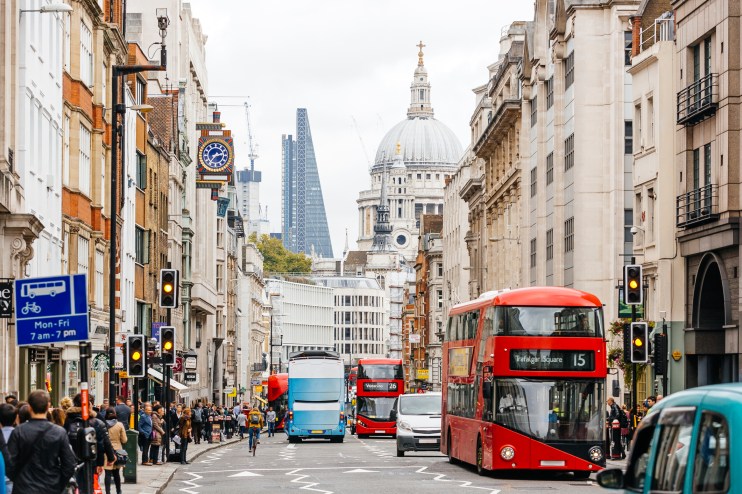‘It’s a pivotal time’

Interview with Simon Kenyon, Group Ambassador for London, Lloyds Banking Group
Taking the pulse of London’s financial health is not easy: for every business that’s thriving, or at least showing ‘bouncebackability’ from the pandemic, there are others struggling to keep the wolf from the door.
But the economic pulse is beating a little faster inside the M25 than everywhere outside the orbital motorway, according to Lloyds Bank’s latest Businesses Barometer, which found the capital’s companies are currently the most confident of all UK regions. Fifty-nine per cent of London businesses are optimistic about their own medium-term trading prospects.
“It’s a pivotal time,” says Simon Kenyon, speaking to City AM fresh from his appointment as Lloyds Banking Group’s new Ambassador for London. He continues to serve as Managing Director of Client Products in Lloyds Bank’s Commercial Banking division, supporting businesses with access to finance, specialist lending and working capital management tools.
Lloyds Banking Group has provided almost £13bn of Coronavirus Business Interruption Loan Scheme (CBILS) and Bounce Back Loan Scheme (BBLS) loans to help clients through the impact of coronavirus.
“Particularly at the start of Covid I was involved in the work with the Treasury and the British Business Bank around the design of many of the loan schemes,” he says, reflecting on the past 18-plus months. “We are at an interesting time as some of those schemes start to mature,” he continues. There have been concerns that some loans will not be repaid, but Kenyon says that what Lloyds has seen is “encouraging so far, although it remains early days. The take up of the pay-as-you-grow scheme in particular has been reassuring”.
The pandemic’s impact, of course, remains ongoing, along with the other challenges facing businesses: navigating post-Brexit rules, supply-chain resilience, labour shortages – it seems to be an ever-growing (and often interlinked) list.
“There are of course firms with challenges,” says Kenyon, who has worked for Lloyds for 15 years. “We have scaled up the support for businesses in that position – we are there to stand by them. Overall, I feel quite positive but banks need to continue to support those companies and individuals that are still finding things difficult.”
Kenyon succeeded Ed Thurman in the London role. He will lead a team of senior colleagues, working with the capital’s politicians, business networks and charities to address issues affecting both companies and communities.
Lloyds Banking Group has nine further regional ambassadors who meet at least once a quarter to discuss common themes and issues such as support for business, the green agenda, housing issues as well as equality and inclusion (the Group launched its ‘Race Action Plan’ in July 2020).
A further theme for London is helping to improve digital skills. The Lloyds Bank Academy has so far provided more than 19,000 Londoners with digital tutorials, while more than 500 people have joined face-to-face digital training sessions. “London is a bit more ‘digital’ than the rest of the UK but that doesn’t mean there isn’t further work to do,” says Kenyon.
The capital’s political map is complex, with stakeholders ranging from the London Assembly and 32 boroughs to the City of London Corporation. “The politics is one of the things I’m looking forward to,” says Kenyon. “There’s also London’s diversity and what this means for what Lloyds Banking Group is doing with our Race Action Plan.”
Kenyon, who is originally from Yorkshire and attended Durham University and subsequently Oxford University, is “passionate” about the capital. He lives in Dulwich, his wife works at King’s College Hospital in nearby Denmark Hill, which is also where his two children – now aged 16 and 14 and both Crystal Palace supporters – were born.
Lloyds Banking Group is under the relatively new leadership of Charlie Nunn, who announced in August that he would spend his first few months getting to know the Group’s people, customers and business better before outlining any strategic plans.
Kenyon is taking a similar approach to his new London role. “We need to listen to our contacts and stakeholders and work out where we can help most, while always focusing on what we can do in our day-to-day business as a bank to help Britain recover, to help firms bounce back, and to help support individuals through difficult personal times as a result of the pandemic,” he says, when asked his priorities. “That’s the core of what we do and that will remain critical to everything that we do.”